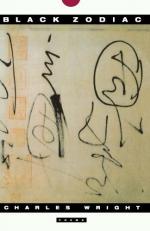|
This section contains 5,719 words (approx. 20 pages at 300 words per page) |

|
SOURCE: “Slide-Wheeling around the Curves,” in Southern Review, Vol. 27, No. 1, January, 1991, pp. 221-34.
In the following review of The World of Ten Thousand Things, Bedient analyzes perceived weaknesses in Wright's poetry from the 1980s. While praising Wright's uncommon ability to “pierce the skin of familiarity with rays of darkness,” Bedient contends that Wright's “journal” poems and subsequent writings lack the authority, focus, and provocative surrealism of his earlier work.
After T. S. Eliot, Charles Wright has been the modern poet in English most afflicted and gifted by a sense of his own insufficiency before the absolute—that “black moth the light burns up in,” as he put it in “Death” in China Trace (1977). His sensibility itself has seemed like a gorgeous insect crippled on the windshield of the speeding galaxy. Through his startling figures and, if less so, his eloquent rhythms, he has intimated an unthinkable glory of...
|
This section contains 5,719 words (approx. 20 pages at 300 words per page) |

|


